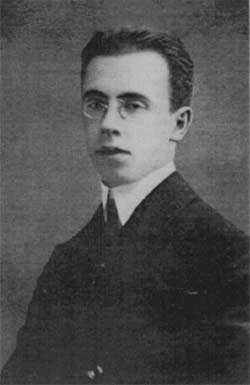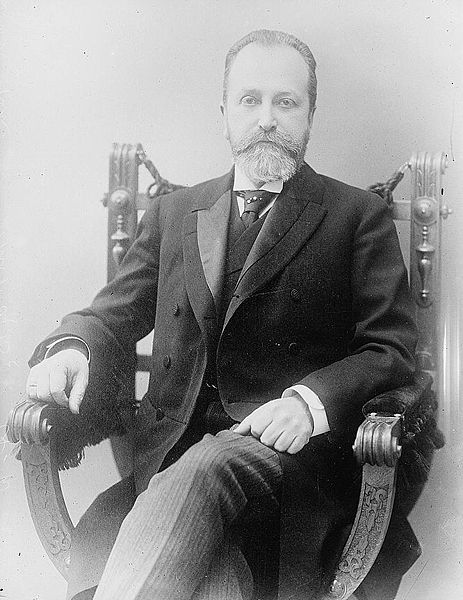<Back to Index>
- Anarchist Revolutionary and Agent of the Okhrana Dmitry Grigoriyevich Bogrov, 1887
- 4th Prime Minister of Imperial Russia Count Vladimir Nikolaevich Kokovtsov, 1853
PAGE SPONSOR

Dmitry Grigoriyevich Bogrov (1887 – 24 September 1911) (Russian: Дмитрий Григорьевич Богров) was the assassin of the Russian Prime Minister Pyotr Stolypin.
Born Mordekhai Gershkovich Bogrov (Мордехай Гершкович Богров) into a family of Jewish merchants in Kiev (Russian Empire), Bogrov, while simultaneously acting as an anarchist revolutionary, had been an agent of the Okhrana secret police since 1906, informing on the activities of Socialist Revolutionaries, Social Democrats and anarchists.
On 14 September 1911, Dmitry Bogrov shot the Russian prime minister Pyotr Stolypin, in the Kiev Opera House, in front of Tsar Nicholas II and two of his daughters. Stolypin died four days later. This act was committed ostensibly in order to decapitate a successful and popular conservative reform movement and thus hasten violent revolution. Bogrov was also attempting to stop the anti - Jewish pogroms that Stolypin was inciting. However, it has been alleged that Bogrov was permitted to act at the behest of extreme right wing elements in the Tsarist secret police who detested Stolypin because of his agrarian reforms and his flair for parliamentary government. (Aleksandr Solzhenitsyn extensively investigates and gives full credit to this conjecture in his historical novel August 1914.)
Bogrov was tried by the district military court. Despite the plea of Stolypin's widow to the court to save Bogrov's life (she said that taking the young man's life would not bring her husband back), Bogrov was sentenced to death and executed by hanging on September 24 [O.S. September 11] 1911 in the Kiev fortress of Lysa Hora.
Significantly, the investigation of Stolypin's assassination was later discontinued at the express order of Nicholas II.

Count Vladimir Nikolaevich Kokovtsov (Russian: Влади́мир Никола́евич Коковцо́в) (1853 - 1943) was a Russian politician who served as the Prime Minister of Russia from 1911-4, during the reign of Emperor Nicholas II.
Vladimir Nikolaevich Kokovtsov was born in the Russian Empire on 18 April [O.S. 6 April] 1853.
Following graduation from the Imperial Alexander Lyceum
in December 1872 Kokovtsov applied for admittance to Saint Petersburg
State University to study law on the recommendation of Aleksandr
Gradovsky, Nikolai Tagantsev and S. Pakhman all notable legal
authorities of the time. However, his
father, who had promised to pay for his education suddenly passed away
leaving the family in strained financial circumstances. As a result,
instead of attending university he entered the civil service to provide
him and his family an additional income.
Kokovtsov was admitted as a candidate for a civil service position in the Imperial Ministry of Justice serving first in the statistical, then the legislative and finally in the criminal office. From 1879 - 90 he served as Senior Inspector and Assistant Head of the Central Administration of Prisons. This period is noted for its prison reforms formulated by State Secretary K.K. Grot a senior member of the Imperial State Council. From 1890 -96 he served in the State Council as Assistant State Secretary, State Secretary and finally as Assistant Imperial Secretary where he worked primarily on matters reviewed by the Russian Imperial State Council's Department of State Economy.
From 1896 - 1902 he served in one of the three Assistant Minister of Finance positions under Sergei Witte.
After resigning from the position, he served as Imperial Secretary until his appointment as Minister of Finance in 1904.
He resigned the next year when his former superior in the Finance Ministry, Witte, assumed the Chairmanship of the Council of Ministers. During this time - although not a Minister - he played a substantial role in securing a loan that did nothing less than keep the Imperial government from having to devalue its currency and leave the gold standard. At the time, the gold standard was the basis of almost all financially stable, secure and modern countries. Kokovtsov returned as Minister of Finance in the cabinets of Ivan Goremykin (1906) and Pyotr Stolypin (1906 - 11) .
Kokovtsov succeeded Stolypin as Chairman of the Council of Ministers after Stolypin's assassination in 1911, while also maintaining his post as Minister of Finance, and held both offices until his retirement in 1914.
Upon retiring, Kokovstov was invested with the title and rank of Count. After the October Revolution of 1917
he escaped with his family to Finland and eventually settled in Paris,
France. He was a leading figure in Russian emigre society until his
death on 29 January 1943.
Witte states in his autobiography that while Kokovtsov was serving as one of his assistants, he was left alone to do the business he knew so well and that Kokovtsov was the source of several small but meaningful reforms in the finances of the Russian Empire.
Much was made of Kokovtsov's differences with Witte which resulted in the two refusing to work with one another after 1905 - 06. The apparent cause of these differences were conflicts over courses of action in the preparation for peace talks with Japan, following the Russo - Japanese War; the changing of the government structure in the wake of widespread political unrest; Witte's opposition to several of Kokovtsov's policies as Minister of Finance during the Russo - Japanese War, and in an important loan negotiation that occurred in 1905 - 06. These differences were made public in the Council of State when one or the other would make comments in opposition to the other's viewpoint on various issues.
Many historians have made the case that the differences were the result of Witte's desire to return to the Chairmanship of the Council of Ministers (Prime Minister of Russia) and his knowledge that his long time associate was one of his chief rivals for the position. Some speculate that the differences were actually rather minor and overstated so that these two men, being in opposing political camps could safeguard the financial reforms they worked together to implement in the 1890s and early 1900s. It is known that Kokovtsov did visit Witte in 1915 during the illness that led to Witte's death and that Witte offered Kokovtsov the position of State Controller in his government which was a ministerial post.